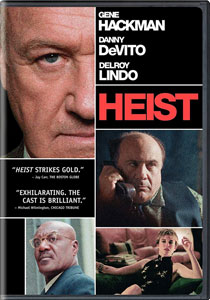“Heist” (2001) had the misfortune of being a crime film – and one with an airplane heist in its plot — coming out in the wake of 9/11. But hopefully this commercial flop has become at least a cult classic, because it’s a brilliant examination of honor – and dishonor – among thieves, featuring writer-director David Mamet’s usual intricate plotting but adding in memorable, fleshed-out characters.
Highly quotable
Mamet isn’t making a particularly groundbreaking commentary, but he makes a familiar point in delicious fashion. He accepts that criminals love money, which is why containers of gold make a perfect maguffin. Consider these lines from the highly quotable film:
Coffee Cart Man: “Hey buddy. You forgot your change.”
Joe Moore (Gene Hackman) (taking the change): “Makes the world go round.”
Bobby Blane (Delroy Lindo): “What’s that?”
Joe Moore: “Gold.”
Bobby Blane: “Some people say love.”
Joe Moore: “Well, they’re right, too. It is love. Love of gold.”

“Heist” (2001)
Director: David Mamet
Writer: David Mamet
Stars: Gene Hackman, Rebecca Pidgeon, Danny DeVito
And this one-liner:
Bergman (Danny DeVito): “Everybody needs money. That’s why they call it money.”
“Heist” doesn’t get as much into the scheme’s details as some of Mamet’s other films, but there are a lot of joys to be had as the (relative) good guys – Joe, Bobby, Ricky Jay’s Pinky and Rebecca Pidgeon’s Fran – work the complex steps required to get the gold.
While fooling the authorities is of course crucial, “Heist” has the additional wrinkle where the good guys have to be cautious of one partner, Sam Rockwell’s Jimmy. He’s the nephew of DeVito’s Bergman, who wants to ensure his cut of the takings.
During one interlude between steps of the heist, Bergman notes that they could all be sipping drinks on a beach and enjoying their riches if not for all the double-crossing. But Bergman started the vicious cycle by withholding Joe’s payment from a previous job and forcing him to do one more.
Good thieves and bad thieves
Everyone in “Heist” is a thief, but there’s no question Bergman is the bad guy and Joe’s team is the good guys within this context. There’s great chemistry between an on-point Hackman and Lindo in particular. But beyond that, there’s room for the mistrust that makes this genre so juicy when done well.
In terms of plot details, “Heist” pulls back from the fascinating weeds of “House of Games” and “The Spanish Prisoner.” More stuff happens off-screen here, as if Mamet is picking out the highlights of the trickery. That’s OK, because the skill of Joe’s team is demonstrated robustly enough that we can fill in the blanks. We know they can pull off something as simple as creating a fake security company in their sleep.
In fact, there’s quite a bit of shorthand between Mamet and his trusting audience. At no point in the film are we told the “why” of the plans; we just see them being carried out. For instance, we see Joe’s team planting explosives by a rural roadside.

A grand plan well executed
We’re engrossed by the tension when a patrolman comes along and questions them, with the veterans staying cool and rookie Jimmy being anxious, but we have no idea why they’re planting the explosives. As viewers, we trust that Mamet will pay it off later, and of course he does.
The film is violent at times, the emotions and relationships between characters are realistic, and the potentially high price of crime is outlined. But “Heist” is ultimately about rooting for a guy we like – as long as we don’t learn too much about the entirety of his criminal career — to get away with his intricate plan by the end.
Despite being less stylized than some of Mamet’s previous work, “Heist” doesn’t sacrifice the fun of a grand plan successfully executed or the comforting notion that the thief with the most honor will be rewarded in the end.

